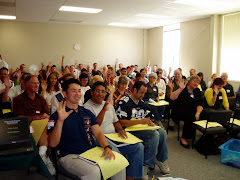
You don't want just S.M.A.R.T. goals, NO what you need are S.M.A.R.T.E.R goals!
This is not the entire presentation I give on this "updated" model of SMART. I'll give you the basics and then can you add to each of them and make it your own.
SPECIFIC:
Be specific about what you want. If you are too vague or general in describing your goal you are diluting your ability to achieve it. Be very detailed about what you want and ask questions like: (some may be more relevant than others)
- What exactly do you want?
- When exactly do you want it?
- What does it look like, sound like & feel like?
- How much of it do you want?
- How will you know when you have achieved it?
- How will you fully describe this in see, hear observe language?
When being specific I recommend that you ensure that your description of what you want is not just in detail but also include sensory based wording i.e. what will you see? what will you hear? How will you know you have achieved your goal? - specifically using visual, auditory and observable wording to describe this.
MEANINGFUL:
When your goal is full of meaning - you will not be stopped!
ATTITUDE: Your attitude is a priority when it comes to ensuring your success when goal setting.
- How resilient will you need to be?
- How disciplined do you need to be?
- What is the specific attitude that you need to ensure you get what you want?
- What state of mind do you need to be successful?
These questions need to be answered and you need to consider both the best and worst case scenrio's and have the attitude that will get you through any and all difficulties that you may face. Having the ability for you to access the right attitude may be beyond you as this is a specialist field. What I suggest, if you do not know how to do this, then seek out a Neuro Semantic Meta-Coach or an NS Trainer. They'll get this sorted for you - easily. Remember, attitude is everything, when it comes to getting what you want.
RESOURCES: To succeed it is highly likely you'll need support. This may require financial, personal, intellectual support. It may be as complex as an extensive marketing and business plan or as simple as calling a friend. These resources may be either internal resources (attitude and mindset) or external resources (money, car, shoes etc...). Your list of resources needs to be well researched and tested, so that you will have all that you need, to achieve your goal.
TIME: Your goal will need to be time bound. The goal needs to have both a start and stop dates.You'll need both short and longer sequenced time frames. This will let you know whether you are on target to achieve your goal.
- When will you start?
- What are shorter timeframes of achievement that you'll review your progress?
- When will you have achieved key milestones along the way?
- When will you achieve your end desired goal?
- How long will this take you?
 the need to align with other time frames that may be out of your control. i.e. a goal of learning to ski may not be possible until the winter months.
the need to align with other time frames that may be out of your control. i.e. a goal of learning to ski may not be possible until the winter months.ECOLOGY This is a step that is often overlooked. In all your zest to work towards your goal you miss considering what could go wrong and whether there is the possibility that achieveing your goal, could negatively impact you. Take time to think this through.
What could go wrong?- What danger is there?
- What is out of my control and how will address that?
- Am I prepared for worse case scenarios?
RESET & REVIEW: Set specific times where you will review your progress.
- Is my plan working?
- What is and what is not working?
- What changes need to be made?
- What is relevant and what is not?
- Am I on time or am I ahead of time?
The SMARTER formula is a simplistic yet valuable goal setting formula. It is not what I consider a well rounded and complete personal success model. But, it does have a number of the key points necessary for you to achieve what you want. Do read my earlier article on what they didn't tell you about goal setting.
I hope this helps in giving you a base from which to set your personal goals from. I will be offering challenging views of what is consdiered necessary criteria in goal setting found in NLP and Neuro Semantic goal setting known as a Well formed Outcome. Revist later this month for that info.



















































